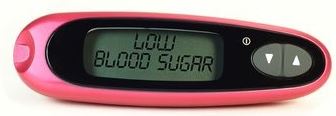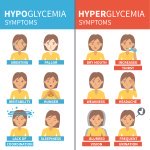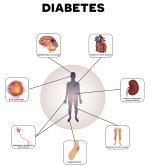Reactive Hypoglycemia
Reactive Hypoglycemia is the medical term for describing reoccurring episodes of low blood sugar that occurs within 4 hours of eating a meal in people who have not been diagnosed as being diabetic.

It is possible to have symptoms that are similar to reactive hypoglycemia without actually having hypoglycemia. Why? If your blood sugar spikes rapidly after eating a meal that is high in sugar or refined carbohydrates, your body may release a lot of insulin to protect itself and to take the excess glucose out of your blood.
Excess glucose in your blood is not a good thing and can cause a host of health problems. It sounds counter intuitive, but blood sugar spikes will cause low blood sugar.
As a matter of fact, if the release of insulin causes your blood sugar levels to drop rapidly, it may trigger symptoms of low blood sugar without your blood sugar actually being in the hypoglycemic range.
Postprandial Hypoglycemia is marked by the following symptoms:
- Unexplained anxiety
- Fast heartbeat
- Feeling very stressed or nervous
- Feeling shaky and actually shaking
- Unexplained sweating
- Intense hunger
- Dizziness
- Blurred vision
- Trouble thinking
- Feeling faint
Learn more about symptoms of low blood sugar . Reactive hypoglycemia (sometimes called postprandial hypoglycemia) is a sign that your body is having trouble maintaining normal blood sugar levels.
What should you do if you think you may have reactive hypoglycemia?
Conventional Approach: You should see your doctor to determine whether or not your symptoms are caused by low blood sugar. Further evaluation of postprandial hypoglycemia depends on the severity of your signs and symptoms.
Alternative Approach: You can purchase a blood sugar monitor at almost any pharmacy (no prescription necessary) and start testing your own blood sugar levels. Learn more about how to maintain normal blood sugar levels Then depending what you learn when you monitor your own blood sugar on whether or not your symptoms resolve once your blood sugar has returned to normal, you can take action.
Actions you can take now that will help regardless of whether you have postprandial hypoglycemia or not.
Reactive hypoglycemia in and of itself does not usually require medical treatment. It can however be an indication that your body is starting to have trouble managing your blood sugar.
Blood sugar problems are normally diet related and take years to manifest. This may be a sign that you are developing Metabolic Syndrome, Insulin Resistance or pre-diabetes.
For example, a 2006 study conducted by Dr. J.S. Christiansen found that the blood sugar levels in healthy individuals were quite a bit lower than those commonly recommended by doctors.
Regardless it will help you if you start paying attention to the timing and composition of your meals.
- Eat several small meals and snacks throughout the day, no more than three hours apart during the waking hours.
- Limit the amount of sugar and simple carbohydrates that you consume (follow a Mediterranean diet)
- Be sure to avoid eating sugary foods and simple carbohydrates on an empty stomach.
- Eat well-balanced meals, include organic or free-range protein, healthy fats, and green vegetables with every meal.
- Be sure to eat food if you're consuming alcohol and avoid using sugary soft drinks as mixers.
If you have had intestinal surgery (gastric bypass or surgery for ulcers) that may have altered your ability to absorb nutrients, you should also consider further evaluation by a doctor.
It's also important for you to include physical activity in your daily routine. Walking, yoga, and swimming are all excellent ways to help your body improve its ability to maintain healthy blood sugar levels and avoid hypoglycemia.



New! Facebook Comments
What do you think? Share your thoughts below...